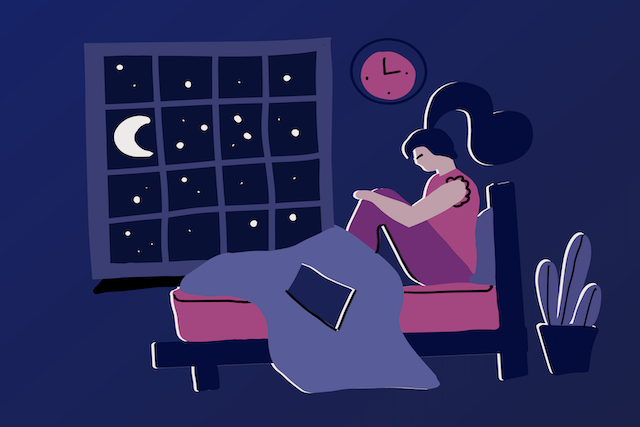
“Don’t waste your time looking back on what you’ve lost. Move on, for life is not meant to be traveled backwards.” ~Unknown
When I was thirty-eight, I was diagnosed with an aggressive breast cancer. During my treatment, one thought persisted: “I can’t wait until this is over and life goes back to normal.”
I clung to the belief that things would go back to how they once were, and all that needed to happen was for treatment to end. It gave me something to focus on that felt real during a time of disruption and uncertainty.
Unfortunately, when treatment ended normal didn’t come.
My hair grew back thinner and was now curly, when it had previously been straight. I had reconstructed breasts that felt strange. And the mental and physical fatigue from treatment didn’t go away; I needed daily naps just to get through the day.
Words would often get stuck on the tip of my tongue, unable to come out. And I sometimes had trouble fully recalling recent events.
I felt fragile, as if I were something less than my pre-cancer self.
Worst of all was the near-constant worry that my cancer would come back and that I’d never regain my stamina. I was a corporate finance attorney who needed to get back to work full-time yet couldn’t.
My life didn’t just feel different, it had been turned upside down.
There was a voice in the back of my head that kept telling me that cancer had somehow changed me and that I needed to figure out how. But that sounded like more work than I had the mental energy for. And I was afraid that figuring it out would disrupt my life even further.
So, I convinced myself that I just needed more time. And when asked how I was, I told people that things were starting to get back to normal.
Although time did help heal my body and my memory, I still felt off. It was as if I was a bystander watching a movie of my life play out in front of me. The star of the movie looked and sounded like me but didn’t feel like me.
This continued for about a year. Until the day I heard my boys laughing hysterically and wondered… when was the last time I laughed? I couldn’t remember.
In that moment, I decided that it was time to figure out how cancer had changed me and what that meant for my future.
Once I admitted this to myself, I discovered that I was angry about all the things I’d lost because of my cancer. That listed included things both big and small. Lost income and clients. A vacation to Disney World with my boys. My pre-cancer hair and nails.
I knew that I needed to grieve these losses but was worried that I would get stuck in grief. Because daily gratitude had helped keep me positive through cancer treatment, and because I had gotten lax in my practice, I recommitted to it. Every night I was grateful for at least three things that I had experienced that day.
And then I realized that there were things to be grateful for because of my cancer. Cancer forced me to slow down. I was spending more time with my boys. And I was learning to be more resilient.
So, I started adding these to my gratitude practice as well.
One of the things I was especially grateful for was the help my family received. Even from people I barely knew. They brought food, took my boys to school, and/or scheduled play dates to distract my boys (and give my poor husband a break).
Reflecting on these acts made me realize that my core value of serving others had changed. I still wanted to serve people, but in a more personal way so that they could live happier, more fulfilling lives, which isn’t exactly fulfilled through corporate finance work.
That’s why I had felt so off. My values had changed, but I hadn’t been listening.
I didn’t know exactly what that meant for my future. But it didn’t matter because I finally had clarity around what was different and how to start moving forward to create my new normal. My redefined value was my compass for doing that (and eventually led me away from practicing law and toward starting a new business).
Although this story is specific to my life, my experience isn’t unique. A natural part of living includes life-altering experiences and events. Things that bring uncertainty and disruption (and remind you of how fragile life really is).
A cancer diagnosis or other illness. Death of a loved one. Even a divorce.
It’s human to want things to return to normal. But instead of getting stuck in that trap:
1. Identify and then grieve your losses.
Disruption brings loss (often many things). It’s normal to feel anger, sadness, and other emotions as a result. To move on, you need to grieve your losses and process your emotions.
Get help if you need it. Human beings were made to connect with and help one another, so there’s no shame in doing what we’re made to do. Plus, it will help speed up the healing process.
2. Practice gratitude while also focusing on the positives that have come from your situation so that you don’t get stuck in grief.
There are many things to be grateful for in daily life, regardless of what’s going on. I recommend focusing especially on the little things that you might once have taken for granted —like the smell of hot coffee that helped jolt you out of bed after a late night, the feel of hot water on sore muscles during your morning shower, or the windchimes outside your bedroom window that lulled you to sleep.
And no matter how difficult life gets, there is always something that you can learn or take from it. Identify what you have learned, how you have grown, and/or the good that has come from your experience.
3. Reconnect with your personal values to determine how they might have changed.
Life-altering experiences have a way of altering your viewpoint on life. And that can result in changes to your core personal values. Your values are your inner compass in life, so it’s important to take the time to determine how they might have changed.
For example, you may have previously valued accomplishment above all else, but now peace is a top value that’s changed how you define success—which means it’s okay if you’re doing less.
When life gets disrupted, you can’t go back. But you can take back control and create your new normal.
About Heather Moulder
Heather Moulder is an attorney and executive coach who helps successful, yet unfulfilled, professionals create success from the inside-out for a fulfilling career that’s balanced with a real life. Connect with Heather for weekly tips and resources on how to retrain your mind for resilience, overcome overwhelm and self-doubt, and confidently create a more fulfilling, balanced lifestyle that’s fun.













 Though I run this site, it is not mine. It's ours. It's not about me. It's about us. Your stories and your wisdom are just as meaningful as mine.
Though I run this site, it is not mine. It's ours. It's not about me. It's about us. Your stories and your wisdom are just as meaningful as mine.
Great article!
I’ve read so many posts on Reddit from people who having the hardest time either coping with stress of the virus or dealing with infection. After over 30 years dealing with severe arthritis and multiple other auto-immune related issues, I feel great compassion for the millions of people having to learn to cope, and the thousands who are spending months sick.
You raised some great points.
Often our internal vision of ourselves is so fixated on an aspect of our lives. I read of multiple athletic types who ended up bedridden for a period of time and their struggle to get back to exercising the way they used to, pushing themselves to their old levels. And they are angry at themselves for not being able to reach those goals.
So many people are frustrated because they want their old life back. And it won’t come back as it was. The pandemic has taken away so much, revealed so much about our country & culture. We must focus on what we can do to make the lives of ourselves & our community better. And learn to be grateful for the little things.
Wish you the best!
Thank you so much for your kind words and wishes. I also wish you the best!
I’ve been thinking about writing this article for years but never did. Every time I started it, I struggled with it.
And then the pandemic hit and I realized it needed to be written (and came out so easily). Perhaps it needed to wait until now?
Great article. I appreciate that you laid out three easy tips to apply some of the lessons learned. Thanks for sharing.
You’re so welcome! I strive to help make things simple and easy (because it’s too much of a drain when things get too complicated).
Tiny Buddah kept me afloat when I couldn’t swim. A new chapter has begun in my life and I am writing the pages. This particular article encapsulated what is so right and true. We can, rather must learn and find the silver linings even in the midst of hell. It may be hard to learn in hell, but you just need to take one step at a time and you can learn on your way out. Don’t look back, don’t look to the side. Keep walking and learn with positivity and grace.
So happy to hear that Tiny Buddha has helped you and that a new chapter has begun. Thank you for the kind words for the article and keep moving forward in that new chapter that you’re writing for yourself!
Thank you for this. Having suffered from breast cancer myself five years ago, I can relate to it all and I also struggled and then thought i found peace afterwards. Unfortunately, two years ago my husband died by suicide. I am not sure how to find any positives or grow from that, particularly since we argued that day and I am racked with guilt, feeling it’s my fault. I will certainly never be back to normal again; I would settle for feeling alive. I am totally alone without him and struggle to keep moving forward–but to what? It doesn’t seem redemption is possible, and my viewpoint is certainly changed, but it is awful to learn a lesson when devastation has already occurred and your reason for living, your best friend, is gone. I keep trying to move forward, but it is certainly a Herculean task.
I’m so sorry for your loss (and honestly don’t know how I’d deal with that myself). I hope and pray that you find peace and a way to forgive yourself so that you can feel alive again. Although I don’t know what that specific path is for you, please know that it’s there somewhere. And I hope that you soon find it. Much love, Heather.
Good lord that is so much to bear. I’ve been through things that I thought would kill me, literally. The thing that saved me is therapy, full stop. Please reach out and get some professional help. You don’t have to go through it all alone and a professional can help you gain some perspective. I hope the guilt can ease, you didn’t do anything wrong. Love and healing energy from this internet stranger. xoxo